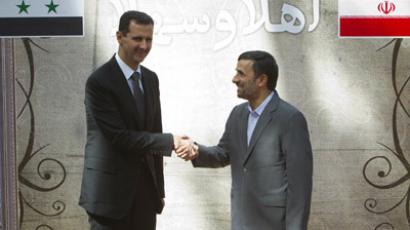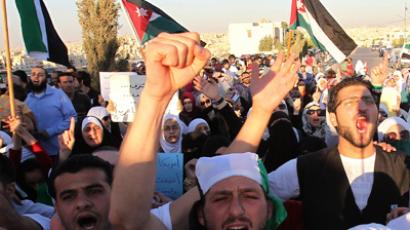‘West won’t back down in Syria, Russia and China must be firmer’
Neil Clark, a contributor to Britain's Guardian newspaper, says Western states are using the recent tragedy in Houla as a pretext for a possible intervention – as they did in 1999 in Yugoslavia and in 2011 in Libya.
Russia warns that the UN Human Rights Council’s resolution condemning the Syrian leadership for last week's Houla massacre risks derailing the peace plan. Moscow called it premature because the investigation is ongoing, and said the resolution is putting pressure on the Security Council, where Russia is resisting foreign military action.On Sunday, President Assad insisted his troops had nothing to do with the slaughter of more than 100 people in the city. He blamed armed rebel gangs for the attack and outside forces for instigating the conflict to trigger intervention.Washington, which backs the Syrian opposition, admits there are plans for military action.RT: Moscow says there are attempts by several countries to use the Houla tragedy to further their own interests and undermine Kofi Annan's peace plan. What do you think about that statement?Neil Clark: I think it is absolutely correct. I think what we have got here on the agenda is pretty obvious. For the last 15 months there’s been an attempt by Western powers, backed by Arab Gulf states, to topple the regime in Damascus.And this reminds me – and I’m sure it reminds a lot of people too about what happened back in the late 1990s in Yugoslavia – a situation where the Milosevic government there was under enormous pressure as well. What we had then was Western forces backing rebels against that regime. We had so-called massacres taking place which were then used as a pretext for military intervention, which has caused what we’ve got in a NATO bombardment in Yugoslavia.And 12 months ago we had exactly the same thing again with Libya. We had atrocity stories come out of Libya. America and Britain were at the forefront of saying “look, we’ve got to intervene” – which is what happened in the end of course. And so, it’s déjà vu, it’s like 1999 and 2011 all over again.RT: So, where from here? Have any lessons been learnt? I mean, Syria's opposition is urging military action and Washington's voicing its readiness to act. Where do you see these calls for foreign intervention heading?NC: I think we are reaching a crucial point of the whole affair now, and I think that Russia has made it quite clear that it won’t support military intervention. They were kind of duped over Libya, and they are not going to be duped again. The only way we can have a peaceful solution to this is if the Western powers and countries like Qatar and Saudi Arabia say to the rebels “look, stop,” and stop supplying them with arms.But unfortunately the stakes are so high here, because what happens in Syria is of enormous global importance, because the West wants this regime to go. They want a pro-Western regime that will come in, that will be more pro-Israel, that will be anti-Iranian, and that would prepare the way for an attack on Iran. So the stakes are incredibly high here. And unfortunately I don’t see the West backing down here. I think, unfortunately, we are going to get more and more aggressive behavior from the West, more and more backing the rebels.And I’d like to see Russia and China come out now and really take an even firmer line on this and say “Look, stop this!”There is a political process in Syria, there is a new constitution, we had an election in Syria, there is a democratic path. And I’d like to see Russia and China really say to the West “Stop, stop, stop your behavior!”RT: You said this is reaching its crunch point. The opposition wants the UN envoy to admit his plan has failed. Is that likely to happen?NC: Let’s face it, the US, Britain, France, Saudi Arabia and Qatar do not want Kofi Annan’s plan to succeed. It’s the Syrian government that wants it to succeed – and Russia and China.I think it was on Friday that the Qatari prime minister said that Kofi Annan should put an absolute deadline for his plan to work. It’s not helpful. I mean, why is the plan not working so far in bringing peace? Because the rebels are still fighting, they are still using arms, terrorist attacks are taking place in Syria. And what is the Syrian government supposed to do in response?It now seems evidence is coming out of Houla that, you know, last week it was the Syrian government, now the evidence is not so clear. President Assad today in Damascus denied any involvement in that he said it was a “horrific, ugly crime.” So, you know, it’s up really to the people who are backing the violent rebels to rein them in.RT: The violence is spreading beyond Syria into neighboring Lebanon. What are the wider consequences if this gets worse?NC: Well, we could be heading towards a major Middle Eastern war unless the West changes its policy. You know, the West is playing a very dangerous game here. Syria was a country at peace 15-16 months ago. There were peaceful protests. We’ve got democratic reform in Syria. So there’s no real need for people to be using violence. And what the West is doing is criminal. What the West and Saudi Arabia and Qatar and other countries were edging to, and Israel too has been supporting regime change, what these countries are doing is criminal because we could have a major world war happening here.RT: Why do you think a significant body like the UN Human Rights Council has already apportioned blame before the results of the international probe?NC: I think this is due to Western pressure, because if you think back seven days ago, right from the very first time we heard about this massacre, the line from the US and Britain was the Syrian government was responsible – before any evidence had appeared. And I’m afraid that there’s been a lot of pressure put on the UNHRC this week. And that is behind that statement which is not very helpful at all.
Push for military intervention ‘enormous’
There is growing rhetoric from the international community pushing for military intervention in Syria. John Laughland from Paris-based think tank The Institute of Democracy and Cooperation, told RT that the push for military interference was “enormous, with France and the US leading the race.”“Of course it’s used as a pretext to start intervention,” said Laughland. He added that the West is repeating its condemnation of the Assad regime “obsessively, so that eventually everybody will take it for truth.”Speaking to RT, historian and author Nebojsa Malic again cited the example of the international community’s intervention in Serbia in 1999. He said that US condemnation of the Houla Massacre in Syria just over a week ago was a precursor to military intervention.“Interestingly enough Syrian rebels have been mentioning they are learning democracy from the Kosovo Liberation Army, while it’s obvious the only thing these guys can teach is how to use massacre to start war. And this is exactly what’s happening,” stressed Malic.














